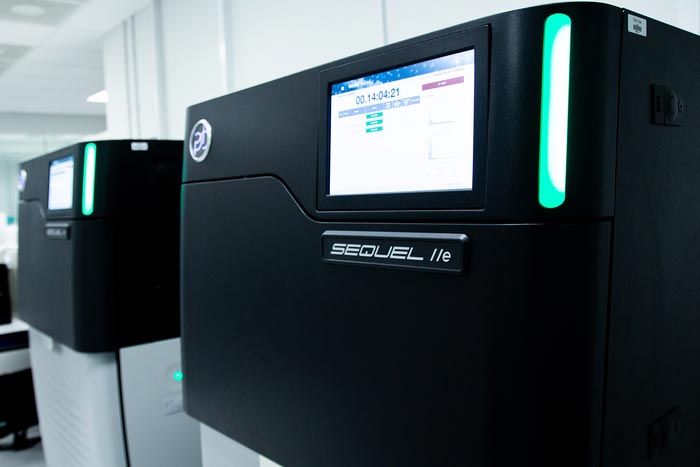New HiFi platform increases sequencing power to help decode the genome of all life on earth

Sequel IIe platforms at the Earlham Institute
Credit: Earlham Institute (EI)
The Earlham Institute (EI) has boosted its capability in high-fidelity long-read sequencing with a twin set of the cutting-edge Pacific Biosciences Sequel IIe platforms to support the Earth BioGenome projects, providing the UK bioscience community with critical technologies for biodiversity genomics.
As the Earth BioGenome Project (EBP) is gaining momentum to sequence, catalogue, and characterise the genomes of all eukaryotic biodiversity on Earth within the next ten years, global efforts are under way to deploy the technology and infrastructure capable of rapidly delivering large numbers of high quality genome sequences.
The Sequel IIe platform empowers scientists to take genomic analysis to a higher level of accuracy by producing high-fidelity long reads (HiFi) to resolve genomes and transcriptomes.
“The Sequel IIe platforms allow us to scale up our existing infrastructure in our contribution to BioGenome sequencing,” said Head of Genomics Pipelines at the Earlham Institute Dr Karim Gharbi. “Demand from the UK bioscience community for higher-quality genome references is growing rapidly, with requests to access HiFi sequence data at an all-time high.
“Feedback from early adopters of the Sequel IIe across the genomics community has been extremely positive with HiFi genomes, outperforming existing resources by at least one order of magnitude. The additional platform will immediately double our genome sequence capability capacity, enabling continued, cost-effective access to HiFi reads for EI researchers and UK bio-scientists.”
In the past few years, the Earlham Institute has made strategic investments in genome-enabling technologies, setting the path for a new era in biology where high-quality, richly-annotated genome sequences are no longer the exception but increasingly the norm.
Director of the Earlham Institute Prof Neil Hall, added: “The Earth BioGenome project initiatives are highly collaborative but the technology and infrastructure capable of producing high-quality genomes at scale need to be ensured. The additional HiFi capacity at the Earlham Institute for the analysis of protist genomes strengthens our position in the global initiative as a leader in genome sequencing.”
These sequencing technologies support several national and international initiatives with the Earlham Institute as a core research partner – including the Vertebrate Genomes Project, Darwin Tree of Life (DTOL) Project, and European Reference Genome Atlas (ERGA) – delivering key sequencing data and analyses for a wide range of organisms, and underpinning ambitious programme to catalogue the biodiversity of single-cell eukaryotes (protists).*
“Key to this investment was the early adoption of the long, high-quality (HiFi) sequencing platform (Pacific Biosciences Sequel II) in 2019, before the Earlham Institute permanently acquired the instrument with support from BBSRC funding,” added Dr Gharbi. “This technology allowed the Institute’s researchers to secure early success in delivering high-quality genome references for key target species and establish EI as a leading centre in BioGenome research .”
Notes to Editor
*As part of the Wellcome-funded DToL project, the Earlham Institute is also leading the development of novel tools to build high-quality genomes from single-cell eukaryotes. Pivotal to this technology are platforms and pipelines for protist species isolated from environmental populations to increase efficiency and reduce cost of library preparation from individual cells.
Researchers from the Earlham Institute recently took part in the PacBio virtual Global User Meeting in two ‘Ask the Expert’ panel sessions. PhD student Anita Scoones from EI’s Single-Cell Group answered questions relating to single-cell Iso-Seq method, while Senior Research Assistant Alex Durrant from EI’s Genomics Pipelines Team shared his expertise on circulomics and sample preparation.
Media Contact
Hayley London
Earlham Institute
Hayley.london@earlham.ac.uk
Office: 01-603-450-107
All latest news from the category: Life Sciences and Chemistry
Articles and reports from the Life Sciences and chemistry area deal with applied and basic research into modern biology, chemistry and human medicine.
Valuable information can be found on a range of life sciences fields including bacteriology, biochemistry, bionics, bioinformatics, biophysics, biotechnology, genetics, geobotany, human biology, marine biology, microbiology, molecular biology, cellular biology, zoology, bioinorganic chemistry, microchemistry and environmental chemistry.
Newest articles

Innovative 3D printed scaffolds offer new hope for bone healing
Researchers at the Institute for Bioengineering of Catalonia have developed novel 3D printed PLA-CaP scaffolds that promote blood vessel formation, ensuring better healing and regeneration of bone tissue. Bone is…

The surprising role of gut infection in Alzheimer’s disease
ASU- and Banner Alzheimer’s Institute-led study implicates link between a common virus and the disease, which travels from the gut to the brain and may be a target for antiviral…

Molecular gardening: New enzymes discovered for protein modification pruning
How deubiquitinases USP53 and USP54 cleave long polyubiquitin chains and how the former is linked to liver disease in children. Deubiquitinases (DUBs) are enzymes used by cells to trim protein…



